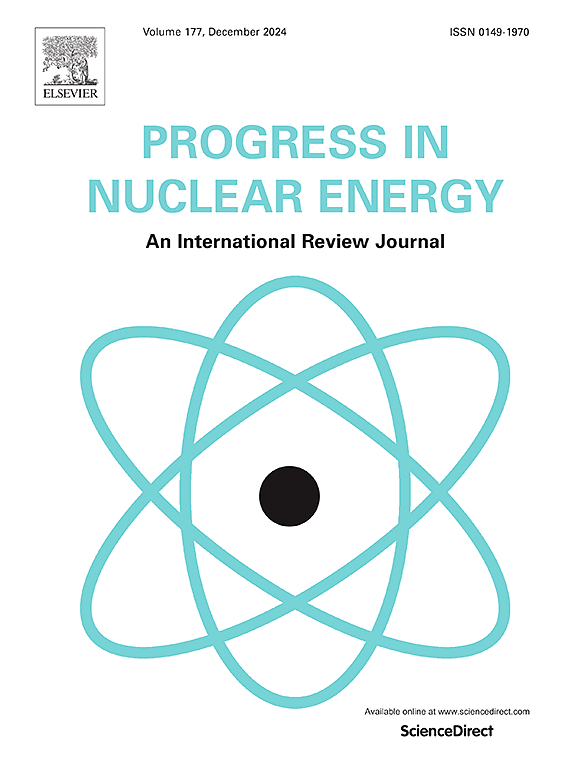Numerical investigation of high-temperature heat pipe bundle failure scenario for heat pipe cooled reactor
IF 3.2
3区 工程技术
Q1 NUCLEAR SCIENCE & TECHNOLOGY
引用次数: 0
Abstract
The heat pipe reactor is an innovative nuclear reactor technology that employs alkali-metal heat pipes to transfer heat efficiently. However, during operation, heat pipes face significant thermo-mechanical loads, which can lead to failures and reduced cooling performance. While numerous studies have conducted numerical simulations to investigate potential failure scenarios and assess the safety of heat pipe reactors, there remains a lack of validation against experimental data. This study evaluates the feasibility of using the thermal resistance network method for simulating accident scenarios based on experimental data from high-temperature heat pipe bundle failure tests. Results show that individual performance differences among heat pipes must be included in simulations; neglecting this can underestimate the maximum matrix temperature. Additionally, modeling failed heat pipes should not assume adiabatic boundary conditions but rather increase thermal resistance appropriately to preserve partial heat transfer capability. Using adiabatic conditions results in a higher maximum matrix temperature compared to applying increased thermal resistance. When the performance differences among individual heat pipes and the corresponding thermal resistance variations of failed heat pipes are taken into account, this approach yields a more accurate representation of the temperature distribution.
热管冷却堆高温热管束失效情形的数值研究
热管反应堆是一种利用碱金属热管进行高效传热的新型核反应堆技术。然而,在运行过程中,热管面临着巨大的热机械负荷,这可能导致故障和冷却性能下降。虽然许多研究已经进行了数值模拟来调查潜在的故障情况和评估热管反应堆的安全性,但仍然缺乏对实验数据的验证。基于高温热管束失效试验数据,对热阻网络法模拟事故情景的可行性进行了评价。结果表明,在模拟中必须考虑热管的个别性能差异;忽略这一点可能会低估最大基体温度。此外,模拟失效热管不应假设绝热边界条件,而应适当增加热阻以保持部分传热能力。与增加热阻相比,使用绝热条件会导致更高的最大基体温度。当考虑到单个热管之间的性能差异和失效热管相应的热阻变化时,该方法可以更准确地表示温度分布。
本文章由计算机程序翻译,如有差异,请以英文原文为准。
求助全文
约1分钟内获得全文
求助全文
来源期刊

Progress in Nuclear Energy
工程技术-核科学技术
CiteScore
5.30
自引率
14.80%
发文量
331
审稿时长
3.5 months
期刊介绍:
Progress in Nuclear Energy is an international review journal covering all aspects of nuclear science and engineering. In keeping with the maturity of nuclear power, articles on safety, siting and environmental problems are encouraged, as are those associated with economics and fuel management. However, basic physics and engineering will remain an important aspect of the editorial policy. Articles published are either of a review nature or present new material in more depth. They are aimed at researchers and technically-oriented managers working in the nuclear energy field.
Please note the following:
1) PNE seeks high quality research papers which are medium to long in length. Short research papers should be submitted to the journal Annals in Nuclear Energy.
2) PNE reserves the right to reject papers which are based solely on routine application of computer codes used to produce reactor designs or explain existing reactor phenomena. Such papers, although worthy, are best left as laboratory reports whereas Progress in Nuclear Energy seeks papers of originality, which are archival in nature, in the fields of mathematical and experimental nuclear technology, including fission, fusion (blanket physics, radiation damage), safety, materials aspects, economics, etc.
3) Review papers, which may occasionally be invited, are particularly sought by the journal in these fields.
 求助内容:
求助内容: 应助结果提醒方式:
应助结果提醒方式:


